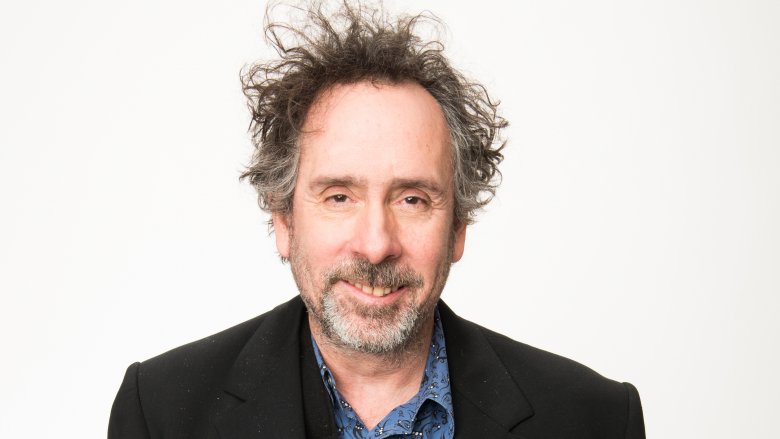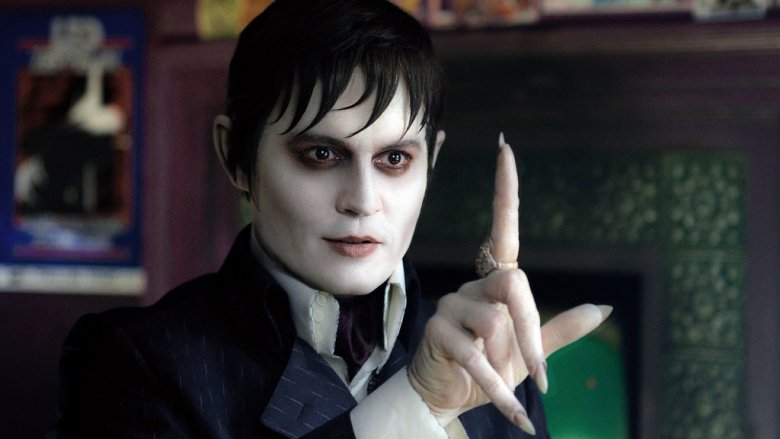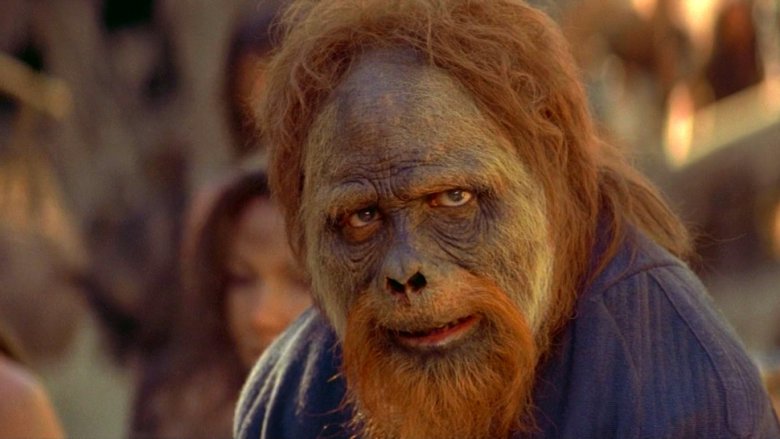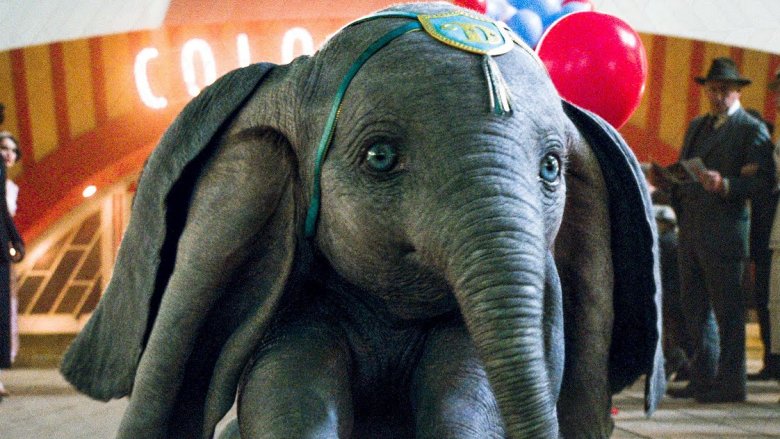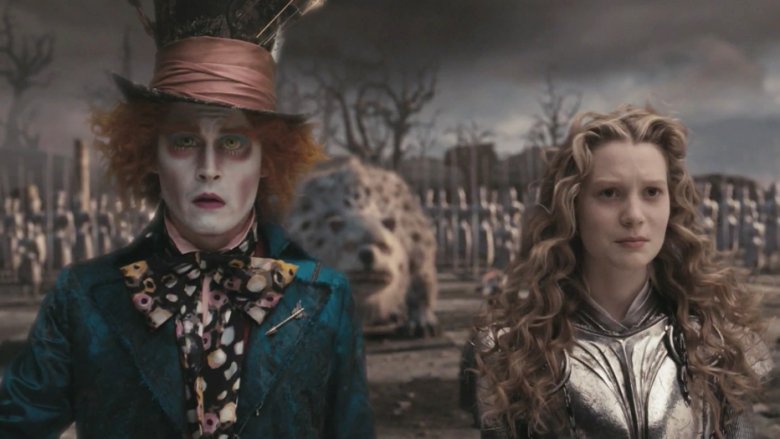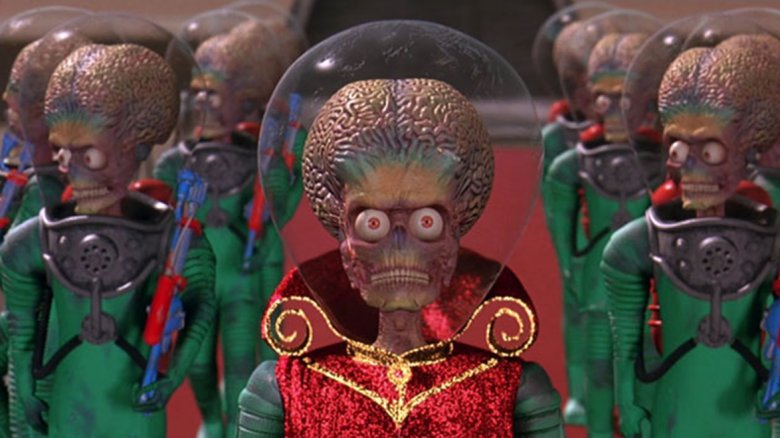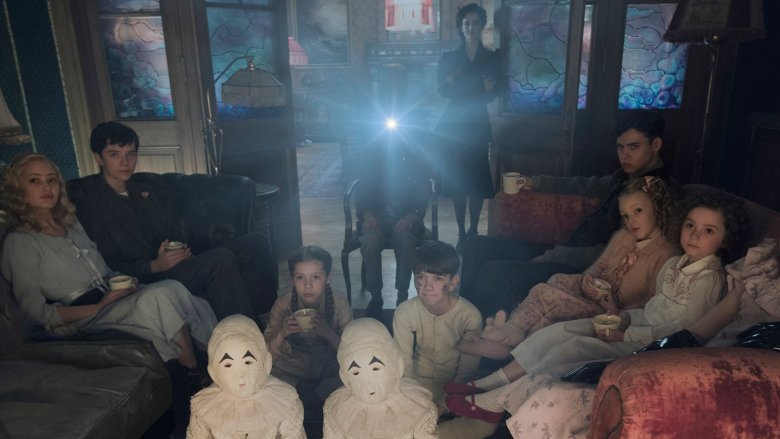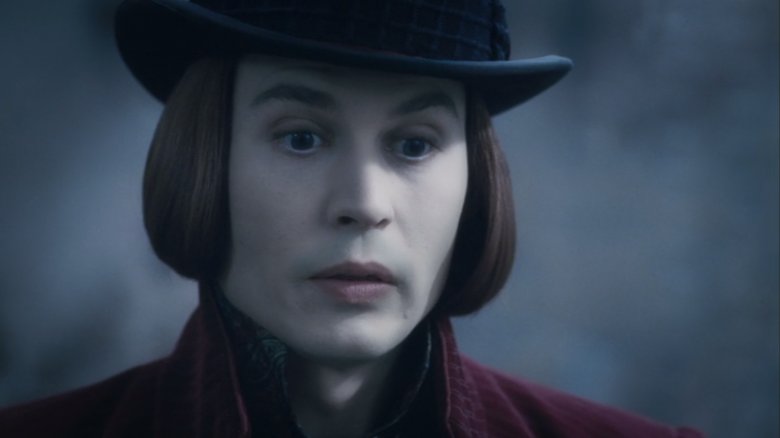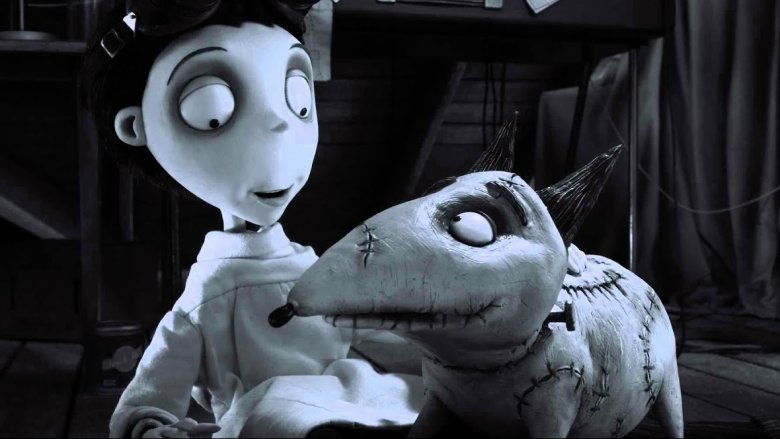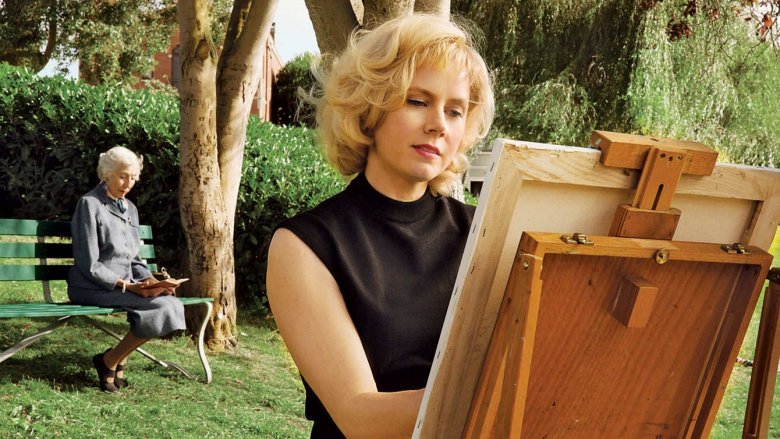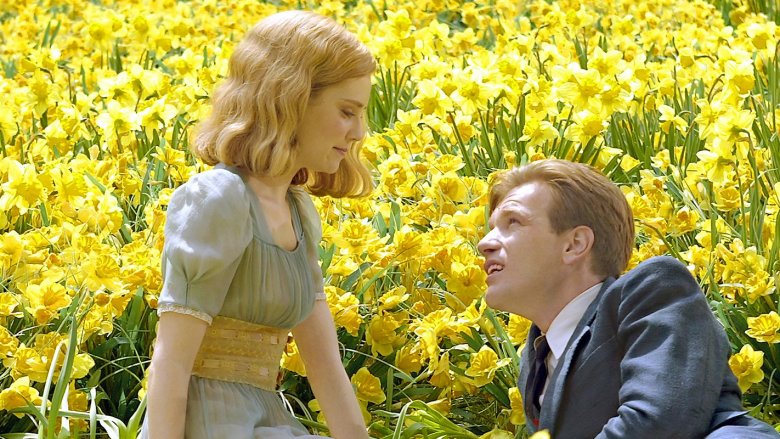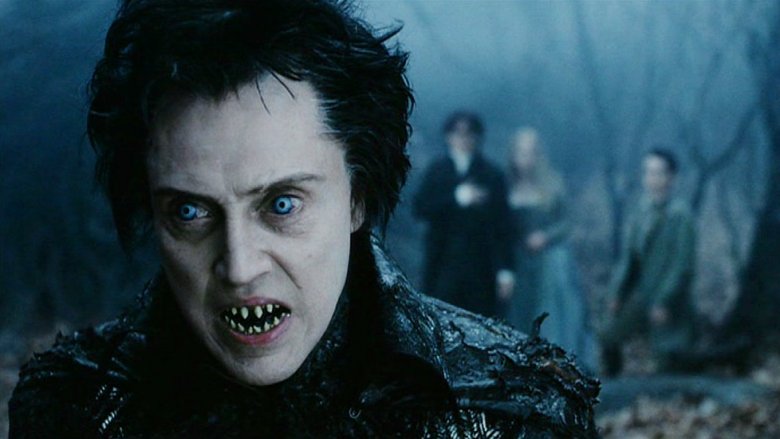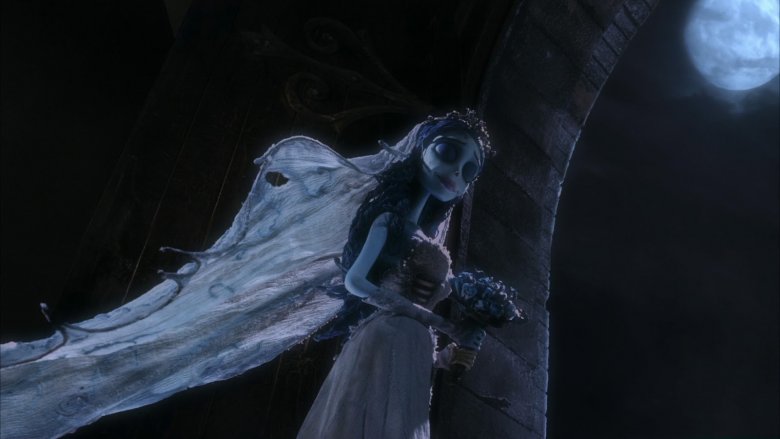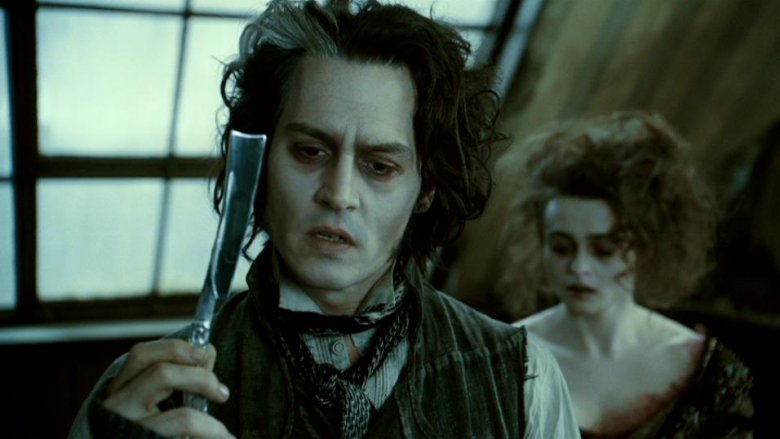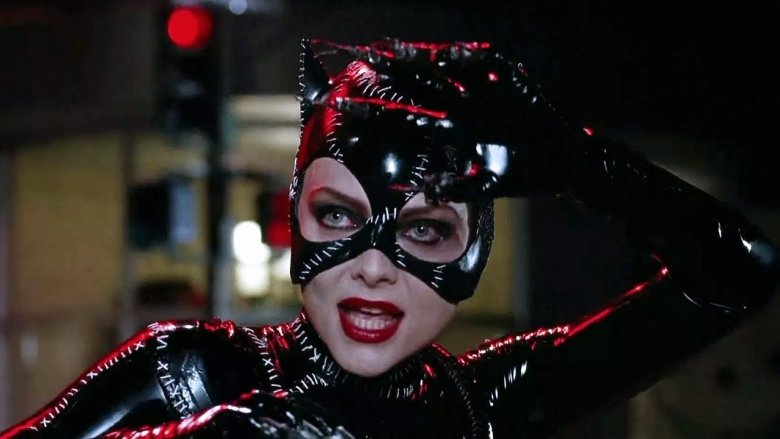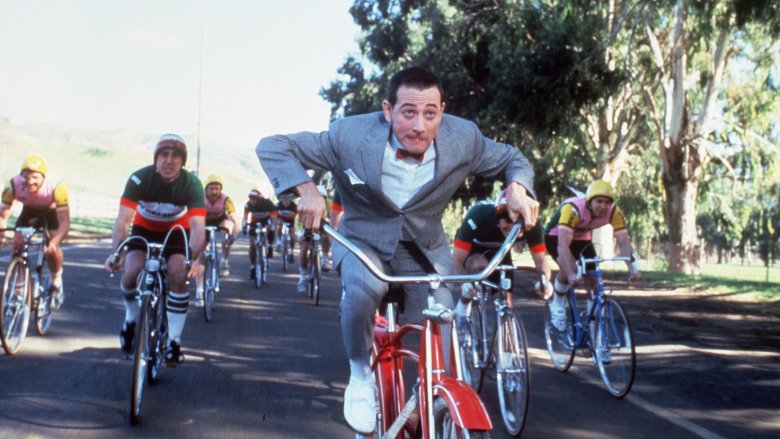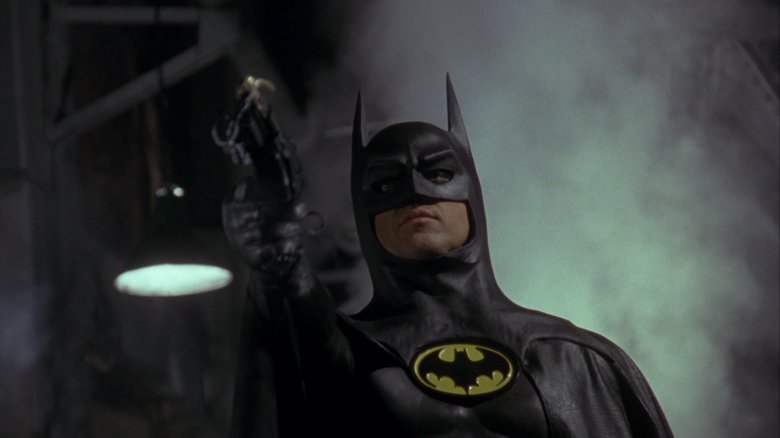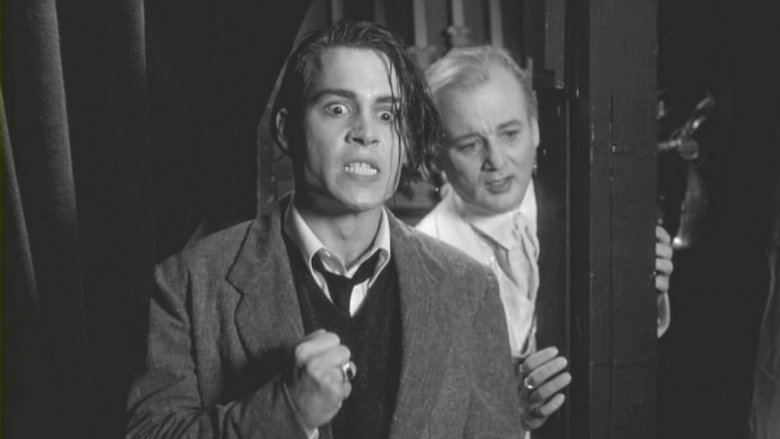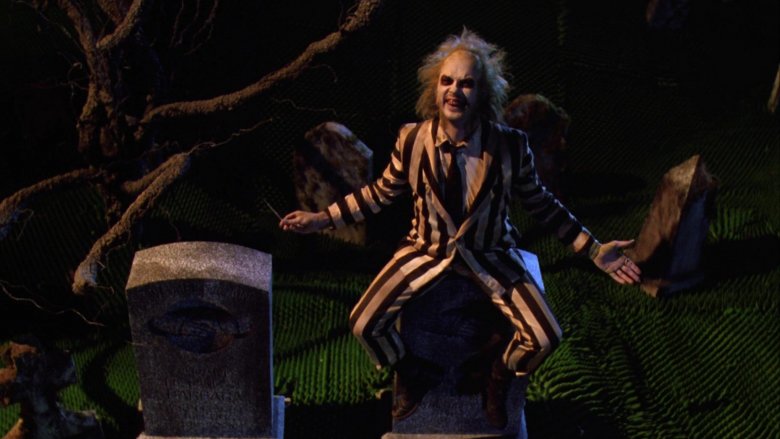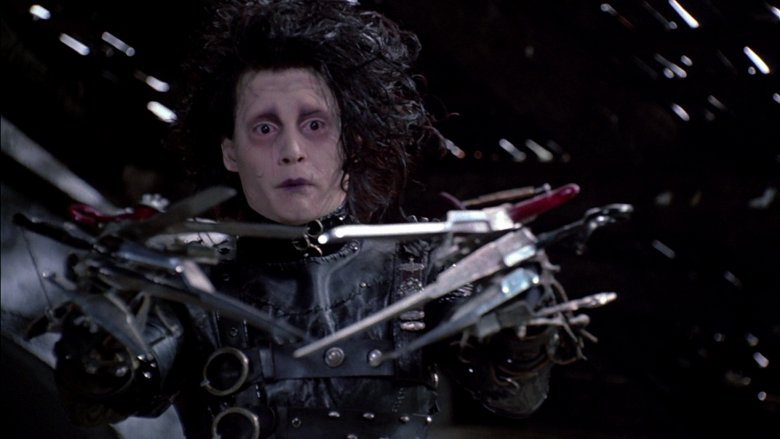Tim Burton Movies Ranked Worst To Best
In the 1980s, a young, aspiring director named Tim Burton got his start in the storied animation department at Disney, and the filmmaking world has been changed for the better ever since. After making a series of short films and directing Paul Reubens' Pee-wee's Big Adventure, Burton burst onto the scene with Beetlejuice, and from then on, he made his mark in film by creating otherworldly universes, unforgettable characters, and fantastical elements, cementing himself as a completely unique and visionary filmmaker.
Burton has had plenty of huge hits that have become classic films and defined generations, but as with any filmmaker, he's also had some misses. Putting aside The Nightmare Before Christmas — which, despite popular opinion, he only produced — his filmography has plenty of highlights, but there are some dark spots in there as well. All daring directors like Burton are bound to flounder from time to time, and throughout his incredible career, he's successfully balanced his flops with his successes. From vampire flicks and lackluster remakes to biopics and modern-day fairy tales, we've ranked Tim Burton's films from worst to best.
Dark Shadows is a major disappointment
Adapting a beloved television show is usually a pretty big risk, and unfortunately for Burton, taking on a campy 1960s series didn't work out particularly well. In 2012, with his frequent collaborator Johnny Depp, Burton took on Dark Shadows, which was based on a Gothic soap opera that originally aired from 1966 to 1971. Dark Shadows tells the story of Barnabus Collins (Depp), a vampire cursed with eternal life after a witch (Eva Green) curses him when he doesn't respond to her advances. Barnabas ends up buried alive, but in the 20th century, he's rediscovered in his tomb and attempts to rejoin society, which works out about exactly as well as you might expect. However, in the end, he eventually falls in love with a human (who becomes a vampire to join him), and they live happily ever after.
Burton has worked with Depp over the course of several projects, but as far as Dark Shadows is concerned, this was one of their least successful collaborations. The film garnered terrible reviews, and despite Burton's signature cinematic flourishes, Depp's silly performance and the insanely outlandish plot simply never gelled together to create any sort of cohesive product. Dark Shadows probably seemed like the perfect adaptation for Burton, but in the end, it proved one of his weakest efforts to date.
Planet of the Apes can't compare to the original
The final shot of the original Planet of the Apes film, where star Charlton Heston realizes that what he thought was an alien planet populated by humanized apes is actually a conquered Earth, is one of the most iconic scenes in film history — and in 2001, Burton made the daring choice to helm a remake of this classic movie. With Mark Wahlberg in Heston's role, Burton crafted a relatively loose adaptation of the original, where an astronaut named Leo Davidson (Wahlberg) lands on an entirely new planet inhabited by apes and tries to overthrow their tyrannical rule. The film's cast was rounded out by huge names like Tim Roth, Helena Bonham Carter, Kris Kristofferson, Paul Giamatti, and Michael Clarke Duncan, establishing the film as a huge Hollywood effort.
Despite the film's pedigree, it performed poorly with critics and also won multiple Golden Raspberry Awards (including Worst Remake) thanks to a terrible central performance by Wahlberg (the oddest possible choice to replace Charlton Heston) and a completely weird, bizarrely confusing ending. Even though it performed well at the box office, Burton said he would rather "jump out a window" than direct a sequel (due in large part to overbearing studio interference typical of Hollywood blockbusters), and Fox, the parent studio of the film, didn't pursue the option, simply rebooting the entire franchise ten years later with 2011's Rise of the Planet of the Apes, which fared much better critically.
Dumbo never reaches the heights of the first film
As far as classic Disney films go, Dumbo, the story of a large-eared elephant who must learn to fly despite ridicule from everyone around him, is still a favorite, and in 2019, Burton helmed a live-action remake of the original 1941 film. Led by Colin Farrell, the star-studded cast boasted names like Michael Keaton, Eva Green, Danny DeVito, and Academy Award winner Alan Arkin. Plus, it told a new story of Dumbo from a human perspective, focusing on a World War I amputee, Holt Farrier (Farrell), who takes a job as an animal caretaker for a circus. His main responsibility is caring for a pregnant elephant who eventually gives birth to a baby with extraordinarily large ears, and though the crowd nicknames him "Dumbo" to mock him, he does eventually, as in the original, take flight and successfully reunite with his mother, thanks to Holt's efforts.
However, this inspiring tale didn't seem to translate with a live-action cast, and it fared poorly with critics, as well as at the box office. The overall critical conclusion was that the film didn't capture the magic of the original, likely thanks in large part to a weirdly expanded story and the completely unnecessary nature of the remake as a whole. Seriously, out of Disney's entire classic film collection, was anyone clamoring for a live-action version of Dumbo? Sure, Dumbo may have flown at the end of the film, but Burton's remake never left the ground.
Alice in Wonderland isn't that wonderful
Lewis Carroll's classic novels Alice's Adventures in Wonderland and its sequel Through the Looking-Glass have inspired generations of artists and readers alike since their initial releases in 1865 and 1871, respectively. And considering that Burton has always gravitated towards fantastical and subtly dark stories, it's no surprise that he chose to adapt Carroll's signature work in 2010.
With Mia Wasikowska as the titular hero, the film creates a visual spectacle as Alice explores Wonderland, with a cast that features Helena Bonham Carter (another Burton regular) as the Red Queen, Anne Hathaway as the White Queen, the late Alan Rickman as the Caterpillar, Stephen Fry as the Cheshire Cat, and of course, Johnny Depp as the Mad Hatter.
Even though Alice in Wonderland seemed like the ideal project for a filmmaker like Burton, it unfortunately produced diminishing returns. Despite a star-studded cast and Burton's typical stylings, the film earned a completely mediocre reviews thanks to its sub-par CGI effects, bizarre take on Carroll's plot (including an enormous sword-fighting interlude courtesy of Alice), and Depp's way-too-whimsical dance at the end of the film. However, this didn't stop Burton from continuing his Carroll-inspired narrative. In 2016, he produced Alice Through the Looking Glass, which saw Wasikowska, Depp, and Bonham Carter, among others, reprise their roles, though that film didn't fare particularly well with critics, either.
Mars Attacks! is one of Tim Burton's weirdest films
With Mars Attacks!, Burton made a potentially risky decision to base a film on a popular trading card game, and in the end, this choice produced decidedly middling returns. The 1996 film featured huge names like Glenn Close, Annette Benning, Danny DeVito, Martin Short, Sarah Jessica Parker, Pierce Brosnan, Jack Black, Natalie Portman, and Michael J. Fox. Plus, the legendary Jack Nicholson showed up in two roles, playing a Las Vegas businessman and the president of the United States. As for the plot, this campy story finds the residents of Earth and Mars meeting officially for the first time, though things go sour pretty quickly, and ultimately, the humans must find a way to defeat the titular attacking Martians.
Upon its initial release, the film received lukewarm reviews, but in the end, pacing issues, a squandered cast, and a concept that seemed great on paper but doesn't work in the final execution makes this one of Burton's less successful outings. However, in the years since its debut, it's become a cult classic, proving that Burton's instincts were somehow right for certain audiences.
Miss Peregrine's Home for Peculiar Children is, well, peculiar
In 2016, Burton adapted the popular children's novel Miss Peregrine's Home for Peculiar Children, which, thanks to its supernatural bent and emotional core, was right up his alley. With a cast that included Asa Butterfield, Chris O'Dowd, Allison Janney, Rupert Everett, Dame Judi Dench, Samuel L. Jackson, and Eva Green as the titular Miss Peregrine, the film focuses on a home run by Miss Peregrine that houses paranormally gifted children and helps to hone their abilities as best as possible. As Miss Peregrine and her children hide themselves in a time loop that she created, they evade unwanted and negative attention, but as they travel through other time loops, the children and Miss Peregrine wind up separated.
Critics didn't love the narrative of Miss Peregrine but still praised Burton's beloved visual stylings, and ultimately, the film earned okay reviews. In the end, using a children's novel rather than an original concept failed Burton, as the story just isn't gripping enough to rank among the director's stronger efforts, resulting in a fairly forgettable film. It might be one of Burton's less appreciated outings, but if you're looking for a well-acted film that contains plenty of the director's typical visual flourishes, you might want to stop by this particular home.
Charlie and the Chocolate Factory isn't as sweet as the original
Everyone is pretty familiar with Roald Dahl's classic novel Charlie and the Chocolate Factory, so it's no surprise that it's been adapted a couple of times throughout the years. In 2005, Burton and Johnny Depp took on this cherished tale, with Depp as Willy Wonka alongside his Finding Neverland co-star Freddie Highmore. Helena Bonham Carter, Missi Pyle, and the legendary, late Christopher Lee also appeared in the film, which re-tells Dahl's story of an impoverished young boy named Charlie (Highmore) who's invited to tour a chocolate factory, unaware that the entire experience is a contest to find Willy Wonka's successor. Obviously, Charlie, who's pure of heart, wins the contest and the factory in one fell swoop.
One of Burton's biggest innovations in the film was in the form of Wilbur Wonka (Lee), Willy Wonka's father, which the director felt gave a new dimension to a well-known character. And critics enjoyed Burton's in-depth look at Willy Wonka, but as far as fans of the original are concerned, it's pretty much impossible to replace Gene Wilder, especially considering that Depp's quirky performance felt off-kilter next to Wilder's famous portrayal. By adding new songs, mixing up the narrative, and providing Wonka with a full backstory, Burton missed the mark on what made Dahl's book and the Wilder film so popular in the first place, and as the years go by, audiences have largely forgotten Burton's take on Wonka, still preferring to watch the original version instead.
Frankenweenie is a Tim Burton triumph
In 1984, during his tenure at Disney, Burton crafted a short film called Frankenweenie, a clever re-telling of the classic Frankenstein story about a boy's beloved dog who ends up reanimated, along with a legion of other household pets. Disney ended up firing Burton after he presented them with the film, since they thought it was ultimately unsuitable for children, but after decades establishing himself as a director, Burton returned to the project and made it into a feature length film in 2012.
Ultimately, Disney produced Burton's (literal) pet project, which proved to be both a critical and commercial success for the director and studio alike. Earning over $81 million at the worldwide box office (the movie did better overseas than at home), the film thrilled critics and audiences and even scored nominations at the Academy Awards and Golden Globes. After all, what soulless audience member wouldn't love a heartwarming story of a boy bringing his childhood dog back to life? It also holds the distinction of becoming the first black and white film, as well as the first stop-motion film, to be released in IMAX 3D.
Burton's first effort might have cost him his job, but it proved to be to be an artistic triumph for him (as well as serving as a huge act of vindication) after he paid his dues and became a venerated director in the years that followed.
Big Eyes is a solid and stirring biopic
Tim Burton doesn't usually go for biopics or historical dramas, but with 2014's Big Eyes, he made a film that satisfied both categories. Telling the true story of artist Margaret Keane, whose husband stole her work only to pass it off as his own, Big Eyes is a stylistic yet harrowing portrait of a woman who's overshadowed by her less-talented husband, Walter. The film also includes the lawsuit that Margaret leveled against her husband to win back the rights and credit for her unique and popular paintings, most of which depict figures with, well, big eyes.
Starring Amy Adams and Christoph Waltz as Margaret and Walter, plus a supporting cast that includes Jessica Jones' Krysten Ritter, American Horror Story's Danny Huston, and Jason Schwartzman, the film did pretty well critically. And that praise was largely thanks to Adams and Waltz, two performers at the top of their craft. And of course, they were aided by Burton's fantastical, colorful visuals.
By handling Margaret Keane's struggles with empathy and care, the film presents a rare glimpse into this artist's well-known work, even though she went without credit for years thanks to her conniving husband. It was also a rare awards season favorite for Burton, earning a Golden Globe for Adams, as well as nominations at the ceremony for Waltz and for Best Original Song, thanks to a number written for the movie by Lana Del Rey.
Big Fish is one of Burton's best fantasies
Based on a 1998 novel by Daniel Wallace, Burton's 2003 adaptation of Big Fish became one of his signature films, and thanks to its fantastical imagery, whimsical premise, and extraordinarily sharp script and performances, it's easy to see why. Told from the deathbed of a traveling salesman named Edward Bloom (Albert Finney) in a story he relays to his son Will (Billy Crudup), the movie follows Edward throughout his fanciful, imaginative stories as Ewan McGregor plays a younger version of the dying man. With a supporting cast that includes huge names like Marion Cotillard, Helena Bonham Carter, Steve Buscemi, and Jessica Lange, it's utterly unsurprising that a film relying on visual spectacle populated by an all-star cast was a success for Burton.
Burton was drawn to the project thanks to his own strained relationship with his parents, having lost both of them in the early 2000s. And as such, he wanted to help tell an intimate story of a parent and child's reconciliation before the former's passing. All told, Big Fish is still one of Burton's most beloved movies — netting the film a Golden Globe nomination for Best Picture – Musical or Comedy — likely in large part due to young star McGregor's anchoring performance and the visual feast the film offers up, which strikes an incredible contrast to the grounded story that's instantly relatable to anybody with family issues. In the years after its release, it's even scored a Broadway musical adaptation.
Sleepy Hollow is a fun and frightening horror film
Despite Burton's misses, the director is clearly well-suited for the horror genre, and he proved that with 1999's Sleepy Hollow, which starred Burton favorite Johnny Depp alongside Christina Ricci. Very loosely based on the classic Washington Irving short story, The Legend of Sleepy Hollow, the film details the haunting of the titular small village by the mysterious ghost of the Headless Horseman (Christopher Walken). With all this grim and gory stuff going on, a detective named Ichabod Crane (played by Depp) is sent from New York to figure out exactly what these supernatural happenings really mean and why they're occurring in the first place.
With a cast rounded out by venerated actors like Michael Gambon (who later went on to play Dumbledore in the Harry Potter films), Miranda Richardson, Richard Griffiths (another Harry Potter alum), and Ian McDiarmid (best known for playing Emperor Palpatine in Star Wars), Sleepy Hollow earned decent reviews for the director. A perfect film for any Halloween season, Sleepy Hollow presents an extraordinarily different but ultimately successful take on Irving's original tale by involving New York City and having the Headless Horseman serve quite a different purpose than in the short story. Burton had already made his mark in filmmaking by 1999, but this movie definitively proved that when it came to classic horror, he was the perfect director to take the lead on a project like Sleepy Hollow.
Corpse Bride is a charming and creepy animated classic
Tim Burton did not direct A Nightmare Before Christmas (that credit goes to Henry Selick), but he's still directed a few well-regarded animated films, including the 2005 movie Corpse Bride. With voice acting by reliable Burton regulars Johnny Depp and Helena Bonham Carter, this touching stop-motion film tells the tale of the titular bride, Emily (Bonham Carter), who inadvertently marries a nervous, human man, Victor (Depp) just before his actual wedding to Victoria (Emily Watson). As Victor and Emily take an unexpected journey through the realms of the living and the dead and Victor tries to return to Victoria, things get complicated and more than a little bit creepy.
Thanks to the imaginative animation and the emotional story, Corpse Bride garnered hugely positive reviews. And although it harkens back to the otherworldly look of A Nightmare Before Christmas, Corpse Bride succeeds by utilizing an entirely new plot that bears all of Burton's signature touches and flourishes. In this film, Burton stuck to his roots, and it paid off. Between the groundbreaking animation techniques, bittersweet tale, and exceptional visuals, it's become one of Burton's most well-loved films.
Sweeney Todd: The Demon Barber of Fleet Street is a bloody great Burton film
When Tim Burton adapted an incredibly successful Broadway musical in 2007, plenty of fans attended the tale of Sweeney Todd: The Demon Barber of Fleet Street. Based on the classic musical by Stephen Sondheim, the film, like its source material, portrays the gripping and bloody story of a vengeful barber named Sweeney Todd, who returns to London to avenge the loss of his wife and daughter at the hands of a corrupt judge. Eventually, the barber opens up a doomed shop where he murders his patrons so that they can be cooked into pies by Mrs. Lovett, a down-on-her luck baker who will turn to any means necessary to make a profit.
The cast features plenty of Burton regulars, with Johnny Depp as Sweeney Todd, Helena Bonham Carter as Mrs. Lovett, Timothy Spall as the slimy Beadle Bamford, and the late Alan Rickman as Judge Turpin (the corrupt judge in question), as well as Burton newcomers like Sacha Baron Cohen as a rival barber. Sondheim himself enjoyed the adaptation, and it performed well critically. Plus, casting choices like Baron Cohen, Rickman, and Bonham Carter, who were ideally suited to their roles, paired perfectly with Burton's more macabre sensibilities. Clearly, the Golden Globes agreed, considering the film was nominated for several awards at the 2008 ceremony, nabbing Best Motion Picture – Musical or Comedy, as well as an award for Depp's performance.
Batman Returns is a fantastic superhero flick
After the monumental success of Burton's first Batman film, it makes sense that he agreed to do a sequel. So in 1992, both he and Michael Keaton, well, returned for Batman Returns. In this installment, Danny DeVito, Michelle Pfeiffer, and Christopher Walken play a trio of grotesque villains: the Penguin, Catwoman, and conniving executive Max Shreck, respectively. At the same time, Batman (Keaton) is fighting against the Penguin to ensure he doesn't exterminate all of the firstborn sons in Gotham.
The film, which gave the world Pfeiffer's defining performance as Catwoman, was a struggle to get produced. Burton and Keaton only agreed to come back after Keaton got a significant raise and Burton was assured that it wouldn't be too much of a sequel, electing to pull in Hollywood A-listers for a comic book adaptation (a tradition which would continue throughout the years). Batman's return marked a darker, deeper take on the Caped Crusader. Plus, it gave us a great female antagonist you can actually root for, if you feel so inclined. Sadly, Burton and Keaton both passed on a third film, leaving us with Joel Schumacher's much-maligned Batman Forever.
Pee-wee's Big Adventure was Tim Burton's first feature film
In Burton's feature film debut as a director, he took on a beloved children's character played by Paul Reubens, taking the reins on Pee-wee's Big Adventure. After Reubens' TV show about Pee-wee was a huge success, a full-length movie was an inevitability, and Reubens himself wrote the script alongside comedy legend Phil Hartman, known for his work on The Simpsons and Saturday Night Live. Using a book about screenwriting — specifically, Screenplay by Syd Williams — Reubens crafted a tight script. As he later told a crowd during a panel at South by Southwest, "It's a 90-minute film, it's a 90-page script. On page 30, I lose my bike, on page 60 I find it. It's literally exactly what they said to do in the book."
Burton was ready to prove himself, and alongside a powerhouse like Reubens, he certainly did. Everybody loves Pee-wee, so bringing the character to the big screen was pretty much a slam dunk. Critics adored its whimsical attitude and the continuity of Reubens' signature character, and thanks to a whole bunch of clever jokes, the film just works from beginning to end. As director, Burton was off to a great start, and clearly, he would go on to create his own signature style thanks to Pee-wee's success.
Batman set the stage for modern-day superhero movies
Gotham's Dark Knight has been rebooted plenty of times since he made his comic book premiere in 1939, but the Caped Crusader made his official Warner Brothers film debut in 1989, thanks to Tim Burton. With Batman, which is widely regarded as one of the best Batman movies ever made and the genesis of the modern superhero movie, Burton had a hand in creating an entire genre by crafting a funny yet faithful adaptation of the classic comic.
With Michael Keaton in the titular role, alongside Jack Nicholson as the Joker, Billy Dee Williams as Harvey Dent, and Kim Basinger as Vicki Vale, the film was a critical and commercial success, earning over $400 million total worldwide and remaining the highest-grossing DC comic book film of all time until its successor, The Dark Knight, knocked it off its pedestal in 2008. Thanks to a winning cast and Burton's sharp direction, the film was universally lauded, with a solid rating from critics.
Fans were thrilled to see a gritty, dark superhero story that ended up changing the genre for years to come. The other secret to the film's success was, undoubtedly, Nicholson's performance as the Joker. His performance set a new standard of villainy for generations of new Jokers, inspiring everybody from Heath Ledger to Jared Leto, and his turn is still regarded as one of the movie's ultimate highlights by most fans.
Ed Wood is one of the best biopics ever made
One of Burton's best films is, shockingly, one of his most grounded and realistic projects to date. A biopic of filmmaker Ed Wood, who was famous for making cult films, 1994's Ed Wood stars Johnny Depp as the titular director alongside Martin Landau, Sarah Jessica Parker, Patricia Arquette, Jeffrey Jones, and Bill Murray, and it focuses on a period of Wood's life where he befriended actor Bela Lugosi (Landau).
Critics loved the film, in large part due to Depp and Landau's stunning performances, the black and white cinematography, the perfect one-liners ("Pull the string!"), and the straightforward yet creative approach to Burton's first ever biopic. To be sure, Ed Wood is an unusual movie that nobody knew they needed, but it's cemented itself as one of the director's most important and well-regarded films. Thanks to Burton's incredibly earnest approach in his biography of Wood — who produced campy, pulpy films and is regarded as one of the worst directors in history — he created a legacy for himself as a great director by making a film about a terrible one, creating a name for himself as a serious filmmaker amidst the whimsy that defined the rest of his career.
Beetlejuice put Burton the map
Say his name three times in a row, and you'll regret the consequences, but with that aside, Burton's comedy-horror classic Beetlejuice has been a cult favorite since its release in 1988, and with good reason. As Burton's breakout film, which features Michael Keaton, Geena Davis, Alec Baldwin, Winona Ryder, Jeffrey Jones, and Catherine O'Hara, it tells the scary yet funny story of an undead young couple (Baldwin and Davis) who end up haunting their former home and trying their best to torment its new human inhabitants (played by Ryder, O'Hara, and Jones). Unfortunately, they're accompanied by a particularly irritating poltergeist named Beetlejuice (Keaton).
Upon its release, critics fell in love with the film long before it became a cult classic. Beyond its success at the box office, critics praised the film, which marked the inaugural collaboration between Keaton and Burton. Thanks to Keaton's delightfully bombastic yet carefully crafted performance as Beetlejuice, the film remains beloved simply because it let Burton's spookier sensibilities play perfectly in a movie that still holds up as a classic at Halloween (or any other time of year). In the aftermath of its theatrical debut, it ended up winning an Academy Award for Best Makeup, and it spawned a few spin-offs, including some video games and even a Broadway musical.
Edward Scissorhands is a true Tim Burton classic
When people think of Tim Burton, it's very likely that their minds go right to Edward Scissorhands, and it's easy to understand why. Released in 1990, this signature Burton film tells the incredible tale of a manufactured human named Edward (Johnny Depp) — created by an inventor (the legendary Vincent Price) — who remains unfinished, with crude scissors serving as his hands. When he wanders out of his home, he finds sanctuary with the suburban Boggs family, where Peg (Dianne Wiest), Bill (Alan Arkin), and Kim (Winona Ryder) take in the abandoned Edward, who's terrified and distraught after his inventor suddenly passes away. With the help of his new family, Edward does his best to fit in, but unfortunately, society has never been kind to outcasts and weirdos.
Thanks to its fantastical imagery, central performance by Depp (in the pair's first collaboration), relatable story of an outsider desperately trying to find his place, and larger-than-life set pieces, Edward Scissorhands remains the movie that best displays Burton's signature style and directorial flourish. And touchingly, it's a favorite of the director's as well, since Burton has said it's his most personal film thus far.
